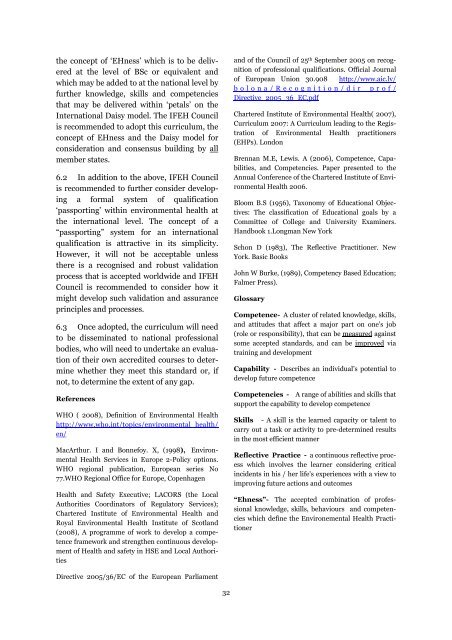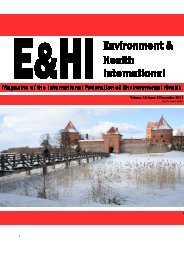ISSN 1683-3805
E&HI Volume 11, No. 1 2009 - International Federation of ...
E&HI Volume 11, No. 1 2009 - International Federation of ...
- No tags were found...
Create successful ePaper yourself
Turn your PDF publications into a flip-book with our unique Google optimized e-Paper software.
the concept of ‘EHness’ which is to be delivered<br />
at the level of BSc or equivalent and<br />
which may be added to at the national level by<br />
further knowledge, skills and competencies<br />
that may be delivered within ‘petals’ on the<br />
International Daisy model. The IFEH Council<br />
is recommended to adopt this curriculum, the<br />
concept of EHness and the Daisy model for<br />
consideration and consensus building by all<br />
member states.<br />
6.2 In addition to the above, IFEH Council<br />
is recommended to further consider developing<br />
a formal system of qualification<br />
‘passporting’ within environmental health at<br />
the international level. The concept of a<br />
“passporting” system for an international<br />
qualification is attractive in its simplicity.<br />
However, it will not be acceptable unless<br />
there is a recognised and robust validation<br />
process that is accepted worldwide and IFEH<br />
Council is recommended to consider how it<br />
might develop such validation and assurance<br />
principles and processes.<br />
6.3 Once adopted, the curriculum will need<br />
to be disseminated to national professional<br />
bodies, who will need to undertake an evaluation<br />
of their own accredited courses to determine<br />
whether they meet this standard or, if<br />
not, to determine the extent of any gap.<br />
References<br />
WHO ( 2008), Definition of Environmental Health<br />
http://www.who.int/topics/environmental_health/<br />
en/<br />
MacArthur. I and Bonnefoy. X, (1998), Environmental<br />
Health Services in Europe 2-Policy options.<br />
WHO regional publication, European series No<br />
77.WHO Regional Office for Europe, Copenhagen<br />
Health and Safety Executive; LACORS (the Local<br />
Authorities Coordinators of Regulatory Services);<br />
Chartered Institute of Environmental Health and<br />
Royal Environmental Health Institute of Scotland<br />
(2008), A programme of work to develop a competence<br />
framework and strengthen continuous development<br />
of Health and safety in HSE and Local Authorities<br />
and of the Council of 25 th September 2005 on recognition<br />
of professional qualifications. Official Journal<br />
of European Union 30.908 http://www.aic.lv/<br />
b o l o n a / R e c o g n i t i o n / d i r _ p r o f /<br />
Directive_2005_36_EC.pdf<br />
Chartered Institute of Environmental Health( 2007),<br />
Curriculum 2007: A Curriculum leading to the Registration<br />
of Environmental Health practitioners<br />
(EHPs). London<br />
Brennan M.E, Lewis. A (2006), Competence, Capabilities,<br />
and Competencies. Paper presented to the<br />
Annual Conference of the Chartered Institute of Environmental<br />
Health 2006.<br />
Bloom B.S (1956), Taxonomy of Educational Objectives:<br />
The classification of Educational goals by a<br />
Committee of College and University Examiners.<br />
Handbook 1.Longman New York<br />
Schon D (1983), The Reflective Practitioner. New<br />
York. Basic Books<br />
John W Burke, (1989), Competency Based Education;<br />
Falmer Press).<br />
Glossary<br />
Competence- A cluster of related knowledge, skills,<br />
and attitudes that affect a major part on one’s job<br />
(role or responsibility), that can be measured against<br />
some accepted standards, and can be improved via<br />
training and development<br />
Capability - Describes an individual’s potential to<br />
develop future competence<br />
Competencies - A range of abilities and skills that<br />
support the capability to develop competence<br />
Skills - A skill is the learned capacity or talent to<br />
carry out a task or activity to pre-determined results<br />
in the most efficient manner<br />
Reflective Practice - a continuous reflective process<br />
which involves the learner considering critical<br />
incidents in his / her life's experiences with a view to<br />
improving future actions and outcomes<br />
“Ehness”- The accepted combination of professional<br />
knowledge, skills, behaviours and competencies<br />
which define the Environemental Health Practitioner<br />
Directive 2005/36/EC of the European Parliament<br />
32



